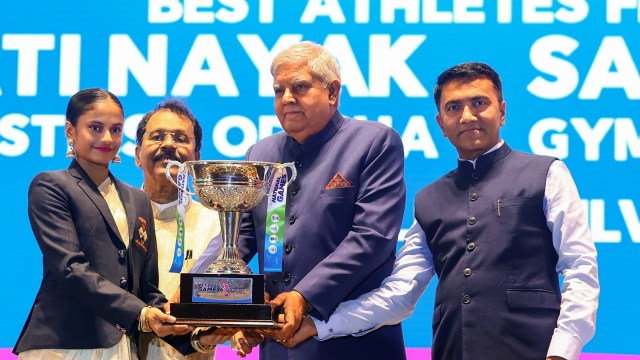No power on earth can deprive our population of fundamental, human rights: Vice President Dhankar
Vice President Dhankar was speaking at the release of the 200th book, ‘Vaman Vriksha Kala’, authored by Goa Governor PS Sreedharan Pillai.
 Vice President Jagdeep Dhankhar with Goa CM Pramod Sawant at the closing ceremony of National Games in Panaji, Thursday. (PTI)
Vice President Jagdeep Dhankhar with Goa CM Pramod Sawant at the closing ceremony of National Games in Panaji, Thursday. (PTI) Asserting that no power can deprive the Indian citizens of their fundamental rights, Vice President Jagdeep Dhankhar on Thursday said that the Emergency was “the darkest period of our history”.
Speaking at the release of the 200th book, ‘Vaman Vriksha Kala’, authored by Goa Governor PS Sreedharan Pillai, Dhankhar who was in Goa, said this book contains detailed information on Bonsai with details like common and scientific names, life span and tree information. The main intention of the book written by the Governor is to firmly establish that the Bonsai is originally an Indian art, as against the widely held belief that it belongs to China and Japan. “We live under perceptions and in the process, we forget our roots, history and culture,” he said.
“When he (Pillai) scored a century (of books), the Prime Minister had released his book. And what was the theme? Dark days of Emergency…coincidence…I have no doubt India has grown to a level that we shall never be visited by such dark days again. No power on earth can deprive our population of fundamental rights, human rights but that certainly was the darkest period of our history. We have to move ahead and learn our lessons,” he said.
The Vice President also emphasised the important role of a Governor: “There are only two constitutional functionaries who take a different oath. Everyone else, right from the PM to the Vice President, to the ministers, chief ministers, ‘abide by the Constitution’ but the President and the Governor ‘protect, preserve and defend the Constitution’. Their job is to ensure everyone falls in line.”
Later in the evening, at the closing ceremony of the 37th National Games in Goa, Dhankhar, heaping praises on the government of Goa for organising the National Games, said, “This is a defining moment. Goa is a tiny state with a very large heart. The day is not far when traditional sports will find a place at the Olympics.”
Stressing the significant strides made by the country in sports, he asked, “Had anyone thought that Bharat would be bidding to host the 2036 Olympics? India is currently the fifth largest global economy and by 2030, it will be the third largest global economy.”
He said global institutions such as the IMF and the World Bank have referred to the Indian economy as a ‘shining star’ and a ‘hot-spot’ destination for investment and opportunity. “After three decades, in 2014, the country got a strong government, ‘poorn bahumad ki sarkar (a government with full majority). I was an MP in Lok Sabha. I have seen what these ‘mili juli sarkarein’ do,” he said.







